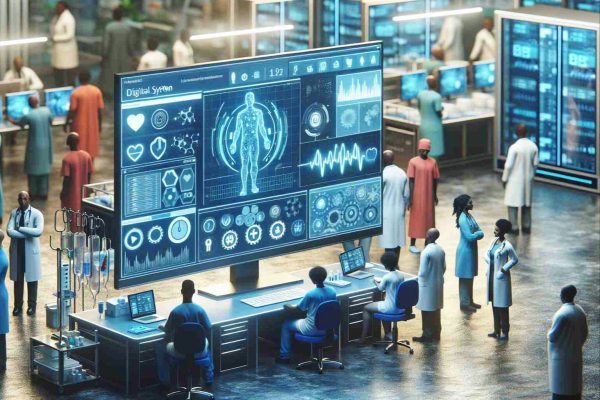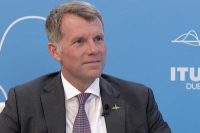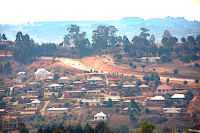
Public Management (483)
The digitization of the healthcare sector is now essential to facilitate patient care and increase efficiency. With the significant resources required for this transformation, African countries are increasingly seeking strategic partnerships to support their digitalization efforts.
American bilateral aid agency The Millennium Challenge Corporation (MCC) announced, last Monday, its commitment to assisting Lesotho in establishing a national digital health system. This initiative, commencing in early 2024, aims to significantly improve the nation's ability to track and manage the health of its citizens, particularly those affected by HIV/AIDS, malaria, and tuberculosis.
"MCC will be making major investments in primary health care equipment and digital health infrastructure, beginning in early 2024. We are also planning for a health data and innovation incubator to create public demand for quality health data. [...] MCC is planning to work with the Ministry of Health to design and implement a fully operational digital health system, across all disease areas, building from the foundation established by PEPFAR– President’s Emergency Fund for AIDs Relief," explains the MCC in a blog post.
The digitization of Lesotho's national health system is a direct outcome of the effective digitization of data from the PEPFAR project. Launched in 2003 and reauthorized in 2018, this initiative received financial backing from both the United States and the Global Fund to End AIDS, Tuberculosis, and Malaria. Originally designed to cater uniquely to pregnant women with HIV, PEPFAR has significantly enhanced clinical monitoring capabilities, facilitating real-time updates of crucial data.
Adoni Conrad Quenum
Artificial intelligence (AI) is rapidly becoming an integral tool across diverse domains, including the military. Military forces are actively exploring and implementing AI solutions to enhance their capabilities and operational effectiveness in various areas.
The United States commits to supporting Nigeria's use of artificial intelligence (AI) in the fight against terrorism within its borders. The support was announced during a press conference held in Abuja, Nigeria, on December 7th by Paul Dean, Principal Deputy Assistant Secretary of the US Office of Arms Control, Deterrence and Stability.
"We want to encourage the positive applications of artificial intelligence in the military. This initiative we launched with our partners just last month is centered around achieving just that: maximizing the tremendous value of artificial intelligence in military applications [While] at the same time, ensuring the international community has coalesced around a series of norms of responsible behavior to make sure that we are reducing the risk of unintended consequences or negative applications," said Paul Dean.
This US commitment comes at a critical juncture for the Nigerian military. Recent criticisms have arisen following a drone strike in Kaduna State that resulted in the deaths of approximately 100 civilians. While acknowledging the need for safeguards surrounding AI deployment in the military sector, the US views itself as a crucial ally for Nigeria in its counter-terrorism efforts. To this end, it is essential to support the use of AI, which could have prevented the obvious error in the Kaduna State tragedy. In the north of the country, Abuja has been facing several terrorist groups, particularly Boko Haram, for many years.
"...We are convinced that when states commit themselves to using this technology in a predictable, transparent, stable, and responsible way, the international community will be in the position of maximizing the advantages while reducing the risks of an irresponsible approach," the U.S. official added.
Adoni Conrad Quenum
The COVID-19 pandemic accelerated the adoption of e-learning platforms, and their usage has continued to rise since. Recognizing the effectiveness of this approach, the Tunisian government has embraced e-learning platforms as a key tool for training its civil servants.
Nizar Ben Néji (photo, center), Tunisia's Minister of Communication Technologies, inaugurated the "Digital Learning Academy" platform on Friday, December 1. The primary goal is to provide 680,000 civil servants with access to online training courses to enhance their digital skills.
The initiative, spearheaded by the Ministry of Communication Technologies, is overseen by Smart Tunisian Technoparks, a Tunisian technopark specializing in information and communication technologies.
The launch of the Digital Learning Academy aligns with Tunisia's comprehensive digital strategy, set to be fully implemented by 2025. This strategy prioritizes the digitization and simplification of administrative procedures alongside the development of enhanced digital services for citizens. To effectively implement these objectives, government employees must adapt to evolving digital standards and embrace new technologies. The Digital Learning Academy addresses this need by providing civil servants with access to a comprehensive range of free, internationally certified online training courses, fostering a more digitally skilled and adaptable workforce.
Adoni Conrad Quenum
Despite the continent's booming startup scene, only a handful of countries –Tunisia, Congo, and Nigeria– have legal frameworks specifically designed to support and nurture local startups. Kenya, with its vibrant tech hub, aims to join this exclusive club in 2024 by enacting its own Startup Act.
Kenya's Startup Bill, which has been in the Senate since 2021, will be enacted in 2024, President William Ruto (Photo, left) announced at the Kenya Innovation Week (KIW) last week. This landmark legislation promises to be a game-changer for Kenyan innovators, offering them not only a supportive legal framework but also tangible benefits and a dedicated platform to access various resources.
“By March, or April next year, we will have a firm startup law in Kenya, which will assist many of our innovators to de-risk their innovations and turn them into businesses," said President Ruto.
Despite lacking such a framework, Kenya's tech ecosystem has consistently attracted most of the investments in Africa in recent years, along with Nigeria, South Africa, and Egypt. According to Disrupt Africa’s "The African Tech Startups Funding Report 2022”, Kenyan startups captured $574.8 million in investments in 2022, $292 million in 2021, and $191.4 million in 2020. This bill is expected to further enhance Kenya's attractiveness, create jobs and wealth, and connect research institutes with businesses.
Adoni Conrad Quenum
Nigeria has one of the most mature technology ecosystems in Africa. To further bolster the attractiveness of this ecosystem, the Nigerian government is forging strategic partnerships with key players in the industry.
On Wednesday, November 29, the African Development Bank (AfDB) announced the approval of an $80 million loan for the Ekiti Knowledge Zone (EKZ) incubation program. The funds will be used to build a 20-hectare green technology park and service infrastructure such as roads, electricity, water supply and wastewater treatment facilities. The Ekiti State Government will finance the project to the tune of $14.8 million, with a total project cost of $94.8 million.
"The Ekiti Knowledge Zone Project design responds to the requirements of technology firms and prospective investors as indicated during the preparation phase, lessons learned from similar Bank-financed projects such as the Cabo Verde and Senegal technology parks, and drew insights from good practices of similar initiatives in the continent and globally," said Lamin Barrow, AfDB’s Director General of Nigeria Country Department.
The EKZ incubation program aims to provide an enabling environment for research and development, information and communication technologies, incubation, and acceleration of technology startups, as well as pre-seed and seed financing. The goal is to transform EKZ into a major technology hub that could create some 26,000 jobs and generate net economic benefits worth $14 million a year.
In April 2023, the federal government granted EKZ "free zone" status, which will enable private investors to benefit from various advantages such as the free repatriation of capital, profits, and dividends by foreign investors; free land during the construction phase; tax exemptions; import and export duty waivers; and expatriate quotas for companies operating locally.
"This funding will play a crucial role in realizing our vision for EKZ [...] EKZ is not just about buildings; it’s about building communities, generating thousands of jobs, including opportunities for women and youth, while fuelling the State’s progress," said Akintunde Oyebode, Ekiti State Commissioner for Finance.
Adoni Conrad Quenum
African countries are actively forging strategic partnerships to remain abreast of the swiftly evolving global technological landscape. In the same vein, Morocco recently inked a memorandum of understanding with a U.S. Tech giant.
On Monday, November 27, Morocco's Ministries of Higher Education and Digital Transition signed a memorandum of understanding (MoU) with American technology giant Oracle, marking a significant step towards enhancing digital skills development in the kingdom's higher education landscape.
The MoU aims to empower professors and students with access to comprehensive training programs, learning resources, and software developed by Oracle. This collaboration aligns with the Kingdom of Morocco's ambitious digital transformation goals, as outlined in its digital transformation strategy, Maroc Digital.
"This memorandum of understanding forms part of the Ministry of Digital Transition and Administrative Reform's vision to increase the number of skills and talents trained in digitalization professions. [...] This will enable us to support our country's digital transformation as a leading producer of digital solutions at regional and continental levels, while also meeting the needs of national and international investors," reads a joint release from both ministries.
Under the terms of the MoU, Oracle will provide Moroccan institutions with access to its Oracle Academy, a global education program that has been empowering students for over two decades. Through this partnership, Moroccan students will gain hands-on experience with Oracle's technology stack, preparing them for successful careers in the digital sector.
The MoU aligns with Morocco's commitment to Maroc Digital, which calls for the annual training of 45,000 digital talents and the conversion of 50,000 young people to digital professions. This initiative aims to position Morocco as a global hub for innovation and digital excellence.
On completion of the training courses, Moroccan students will be able to obtain Oracle professional certifications in various technological fields, enhancing their career prospects and making them highly sought-after professionals.
Adoni Conrad Quenum
In recent years, cybersecurity has emerged as a critical concern for African nations. Collaborating with strategic partners, they are embarking on specific cybersecurity initiatives to achieve predetermined goals.
Kenyan authorities welcomed an American delegation led by Ambassador-at-Large for Cyberspace and Digital Policy, Nathaniel C. Fick, to Nairobi on Monday, November 27, according to a press release issued by the US State Department. The visit marked the second U.S.-Kenyan Cyberspace and Digital Dialogue, which aims to bolster the partnership between the two countries in promoting a secure and stable cyberspace.
"U.S. and Kenyan officials discussed a range of topics, which included engagement on cyber and digital capacity building, implementation of the Framework for Responsible State Behavior in Cyberspace, collaboration on combatting cybercrime, promotion of secure and trusted information and communication technology infrastructure, and the advancement of digital freedom," stated the release.
Cybersecurity has become a crucial concern for African nations as they embark on their digital transformation journeys. Kenya, particularly since the inauguration of President William Ruto, has placed digital technology at the heart of its development strategy, fostering partnerships with various entities in the technology sector to support efforts in this domain. In terms of cybersecurity, Kenya holds a strong position, with a national cybersecurity strategy slated for implementation in August 2022 and a national computer incident response team in place. However, Nairobi has yet to ratify the African Union's Malabo Convention on cybersecurity.
Beyond cybersecurity, the two delegations also discussed topics related to achieving Kenya's objectives in the digital economy sector. Notably, Kenya, under President William Ruto, boasts one of the continent's most mature technological ecosystems, alongside South Africa, Egypt, and Nigeria.
Adoni Conrad Quenum
To expedite its digital transformation journey, Kenya is bolstering its partnerships in the technology sector. Earlier this week, the authorities partnered with American giant Microsoft to improve the delivery of public services.
Stanley Kamanguya, Director General of the Kenya ICT Authority (ICTA), and Phyllis Migwi, Country Manager of Microsoft East Africa Company, signed a memorandum of understanding in the ICT sector on Tuesday, November 21 in Nairobi, Kenya. The aim is to reinforce the digital transformation underway in the country and integrate Microsoft cloud services to improve public service delivery with the adoption of the cloud-first strategy.
By February 2024, the Redmond-based firm will have to put in place a comprehensive framework for this purpose. The move to the cloud should enable Kenya to outsource the security and data protection of all its institutions to the American giant for the next three years, per the terms of the protocol.
"I would like to thank Microsoft for this engagement which has come at the right time. We believe that towards the end of this partnership, we shall enhance our cybersecurity awareness, enhance our digital skills, and develop key technology areas for a vibrant digital sector," said Stanley Kamanguya.
A few months ago, the Kenyan public services portal, eCitizen, suffered a cyberattack claimed by pro-Russian hacktivist group Anonymous Sudan, forcing authorities to take measures to ensure continuity of services like visa, passport, identity card, and driving license issuance.
Yet, Kenya is one of the African countries that performs best when it comes to cybersecurity. It ranks 5th on the continent and, is one of the few with a national cybersecurity strategy. In its report "Cybersecurity in Africa -Call to action" published in June 2023, consulting firm Kearney explains that the continent's ability to resist, adapt, and recover from cyberattacks is low. Sub-Saharan African countries do not invest enough in cybersecurity. The region’s average cybersecurity investment is around 0.03% of GDP while the average benchmark is 0.25%.
Kenya’s digital ambitions place the country among the top African targets for hackers. Therefore, it is allowing itself up to three years –the duration of the agreement with Microsoft– to get up to speed.
"As a leader in the tech space in Kenya, Microsoft is very glad to sign this MoU and for us, we are looking forward to seeing how we shall bring the full power of Microsoft services and products to the government for mutual benefit," explained Phyllis Migwi.
Adoni Conrad Quenum
To improve the efficiency of public services, the Democratic Republic of Congo plans to digitize the whole sector and end physical documents. However, its digitization efforts are hampered by a shortage of skilled employees.
Africa Digital Academy (ADA), a subsidiary of Africa Development Solutions Group dedicated to the creation and management of digital training programs, and DRC’s digital development agency ADN signed a memorandum of understanding on Tuesday, November 21, on the sidelines of the Africa Digital Expo held in Kinshasa, Democratic Republic of Congo. Under the agreement, ADA will train 100,000 Congolese civil servants in 2024 and 2025.
"The collaboration between ADA and ADN, two leading entities in the digital field, is a giant step forward in the effort to modernize the Congolese public administration. We thank ADA for their strategic support and look forward to this collaboration," said ADN coordinator Dominique Migisha (photo, left).
According to ADN, the training program will focus on the fundamentals of cybersecurity, artificial intelligence, digital transformation, and business solutions. The aim is to support and accelerate the DRC's digital transformation, with an emphasis on the acquisition of key skills and the implementation of technological solutions tailored to the country's specific needs.
The new partnership is part of the actions undertaken by the government and its partners to accelerate digitization in the country and equip the country's citizens with the digital skills needed to ensure said digitization and reduce the digital divide.
It is one of the numerous programs the ADA is involved in across Africa. Since October 16, the academy is training 1,000 young Ivorians in digital professions, including cybersecurity.
At the end of the collaboration with ADN, Congolese civil servants will be better equipped to use the public services being digitized in the country.
Samira Njoya
The wave of digital transformation is sweeping across Africa, and Benin stands out as a commendable example. The country has initiated the digitization of a pivotal sector within its economy.
On Tuesday, November 14, Benin’s National Land Transport Agency (ANaTT) officially launched the Electronic Road Freight Management System (SYGFR). Financed to the tune of 290 million CFA Franc (around $479,480) by the Belgian Development Agency (Enabel), the platform provides sectoral stakeholders with an interface for real-time monitoring of road transport activities, freight transport especially.
Once completed, SYGFR will include three modules: freight supply management, statistics and dashboard management, and transport supply management. For the time being, authorities have launched the transport supply management module, which will among other things, facilitate the construction and maintenance of a database of professional drivers, the issuing of transport authorizations and transport cards, and registration of other freight players such as customs brokers and freight lessors.
In addition to facilitating the issuance of transport authorization and cards, the transport supply management module is expected to ease the issuance of consignment notes for freights from the Autonomous Port of Cotonou and other cargo hubs across the country.
"Effective organization is a prerequisite for the development of any sector. This [platform] is a stride forward and we need to embrace a collaborative thinking approach to meet ongoing challenges,” said Jacques Ayadji, who was representing Jose Didier Tonato, the Minister for the Living Environment and Transport in Charge of Sustainable Development.
Under President Patrice Talon, Benin has initiated the digitization of its services to become a tech hub in the West African region. The COVID-19 pandemic accelerated the process, and since then, more than a thousand services have been digitized. According to the United Nations e-government development index for 2022, Benin ranks 149th out of 193 countries, with a score of 0.4264, a leap of 8 places from 2020.
Adoni Conrad Quenum
More...
To accelerate their digital transformation, African countries are forging strategic partnerships. With this MoU, Rwanda wants to further develop its tech sector.
Paula Ingabire (photo, right), Rwandan Minister of Information and Communication Technologies and Innovation, and Mohammed bin Ali Al Mannai (photo, left), Qatari Minister of Communications and Information Technologies, signed an ICT memorandum of understanding on Thursday, November 9 in Kigali. The aim is to strengthen collaboration between the two countries in the fields of public key infrastructure and the formulation of information and communication technology policies and strategies.
"This collaboration is a testament to our commitment to promoting innovation and technological advancement on both local and international levels. [...] This partnership aims to strengthen synergy for mutual growth and development, fostering knowledge and resource exchange in various key areas of the information and communication technology sector," said Mohammed bin Ali Al Mannai.
Like many African countries, Rwanda is multiplying partnerships to ensure its digital transition, with the signing of memorandums of understanding with Kenya and Guinea earlier this year. Rwandan authorities have taken, several steps to strengthen their artificial intelligence, cybersecurity, and smart cities segments. The country is one of the best in Africa when it comes to digitization and it is establishing itself as a tech hub in the Great Lakes region.
Support for research and development in the field of artificial intelligence, exchanges of experience in digital transformation and e-commerce, cooperation in the field of smart cities, and cross-border data flows are other ICT segments covered by the memorandum of understanding signed.
Adoni Conrad Quenum
Tourism, like almost every sector, is undergoing a major digital transformation in Africa. To successfully implement that transformation, some countries are teaming up with tech giants to support their strategies.
Patricia de Lille (photo, right), South Africa's Minister of Tourism, and Alistair Mokoena (photo, left), Country Manager of Google South Africa signed an agreement in Cape Town on Monday, November 13. The aim is to promote South Africa as the choice tourist destination and provide training and support in the sector.
"In an era of digital transformation, collaboration between technology giants and government entities has the potential to reshape industries and enhance public services. [...] This visionary partnership between Google and the Ministry of Tourism, focusing on non-monetary exchanges to leverage each parties’ strengths for mutual benefits," said Patricia de Lille.
This partnership is part of the Ministry's mission to improve the attractiveness of the sector, harness its technological power, and increase the number of tourist arrivals in the country to support economic growth and job creation. Google, the world's largest search engine, has several tools at its disposal, such as Google Arts & Culture, with which the Mountain View firm can highlight the country's tourist destinations, encouraging Internet users to develop a greater interest in South Africa. Startups operating in the sector can be supported by Google programs such as the Start-up Accelerator and the Black Founders Fund.
"As a company that prides itself in organizing the world’s information and making it universally accessible and useful, we look forward to rolling out various programs in conjunction with the department, to fast-track digital transformation in the sector, helping with digital skills and showcasing South African tourism through our Google Arts & Culture platform," said Alistair Mokoena.
Adoni Conrad Quenum
In 2018, Senegal launched a program to rehabilitate its airports. The aim is to improve the passenger experience and position itself as a leading air hub.
Cheikh Bakhoum, director general of Senegal Numerique (SENUM SA), the national agency overseeing public digital infrastructure, and Abdoulaye Dieye, CEO of Blaise Diagne International Airport (AIBD SA), signed a partnership agreement in Dakar on Monday, November 6.
The partnership aims to implement infrastructure solutions to improve connectivity and facilitate the digital transformation of 13 airports in Senegal.
Under the 3-year cooperation agreement, SENUM SA will provide AIBD with fiber optic connectivity, state-of-the-art data centers, and other services. SENUM SA will also contribute its expertise in auditing the information system, supporting AIBD's human resources in supervising installations, and guaranteeing system security in the event of attacks.
The signing of this partnership agreement is part of the program to rehabilitate Senegal's regional airports (PRAS) launched in 2018 by President Macky Sall. The program aims to make Senegal a leading air hub in Africa.
"I am pleased to welcome the director general of Senegal Numerique today, as state institutions must operate in seamless harmony. We are confident that this agreement is timely and will effectively address the imperative of upgrading our airports to meet industry standards, while simultaneously implementing robust IT systems, security protocols, and data backup measures," said Abdoulaye Dieye.
Samira Njoya
To accelerate the realization of their digital ambitions, governments are teaming up with reliable and experienced partners to get technical support for some projects.
On Wednesday, November 1, the Eswatini Communications Commission (ESCCOM) and the United Nations Development Programme (UNDP) signed a memorandum of understanding at the United Nations House in Mbabane.
According to a UNDP press release, the agreement aims, among other things, to improve universal access to affordable ICT services; provide digital services and other government functions; and support the effective implementation of the national digital strategy developed under ESCCOM's leadership.
"This agreement will play a pivotal role in accelerating our progress towards achieving the Sustainable Development Goals. These goals encompass vital indicators such as reducing youth unemployment, bolstering food security, broadening access to ICTs, digitizing services, and fostering financial inclusion throughout Eswatini," said Mvilawemphi Dlamini (photo, left), ESCCOM's Chief Executive Officer.
The agreement calls for the creation of iHubs (innovation hubs) and digital technology action centers to deepen digital inclusion and improve youth employability. These centers will be designed as one-stop shops for ICT training, business development, business relations, financial services, and business mentoring.
The agreement is part of ESCCOM's efforts to develop digital technology and reduce the digital divide in the country. In June, ESCCOM announced the signature of a telecoms agreement with the Mozambique Communications Regulatory Authority (INCM). Ultimately, the agreement with the UNDP will, among other things, help reduce the digital divide in Eswatini, with a focus on marginalized people, notably young people, women, and the disabled.
Samira Njoya















